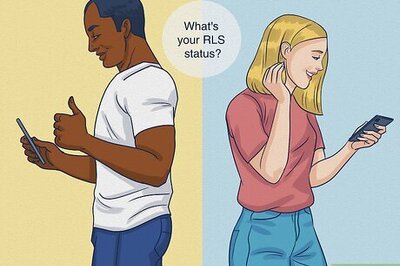
views
Suing in Small Claims

Consult an attorney. Small claims court is the original "people's court," and procedures are simple and straightforward enough that you can handle the matter on your own. However, it's worth getting an attorney's opinion about your case before you file a complaint in court. Search online for your state's bar association. State bar associations have referral programs that can help you find a licensed attorney who has experience handling cases similar to yours.

Complete the correct forms. Each small claims court has straightforward forms that you can fill out if you want to initiate a lawsuit in the court. Use the court located in the county where you live. Look up the airline's official website online to find out the airline's official legal name. They will have an agent for service of process in your state. You may be able to find this on the airline's website, or you can use the business directory on the website of your state's secretary of state. In small claims court, you can only sue for money up to a maximum amount. The maximum amount you can sue for should be listed on the forms or in the instructions for the forms.

File your forms with the court clerk. When you've completed your forms, make at least 2 copies and take your copies and originals to the clerk of the small claims court that you want to hear your case. You'll have to pay a fee to file your forms, typically less than $100. If you can't afford the fee, you may be able to get a waiver. Call the clerk's office before you go to find out exactly how much the fee is and what methods of payment are accepted. The clerk will file your originals with the court and return the copies to you. One is for your records, and one must be sent to the airline. The clerk will also set your claim for a hearing. Small claims court moves fast, so your hearing typically will be less than a month after you file your claim.

Have the airline served. Immediately after you file your forms, have one set of copies sent to the airline's agent for service of process in your state. The easiest way to do this is to mail the forms using certified mail with return receipt requested. You'll get a green card in the mail that shows your forms were received. Keep this card with your copy of your filed forms. This is your proof of service, and you may have to show it to the judge.

Organize your documents and evidence. Get together everything you want to present in court to prove you're entitled to the money you listed in your claim. You may want to write down a brief outline of what you want to say in court. If you've never been to small claims court before, you may want to go one day before your claim is scheduled and observe the proceedings. You may be able to bring witnesses who can testify in support of your arguments. Check with the clerk to find out what you need to do if you want to bring witnesses. You can also introduce physical evidence.

Go to court for your hearing. Arrive at the courthouse at least a half hour before the time your hearing is scheduled so you have enough time to go through courthouse security and find the right courtroom. Dress neatly and conservatively, as though you're going to a job interview. Take a seat in the courtroom gallery until your name is called. The judge will allow you to present your case first. They may ask you questions or simply allow you to speak. Small claims court is relatively informal, but you still want to treat the judge with respect. Always refer to them as "your honor," or use "sir" or "ma'am" as appropriate. After hearing from both sides, the judge will make a decision whether you are entitled to the money you've demanded from the airline.
Working with the Airline

Try to resolve the problem at the airport. The customer service agents at the airport are typically in the best position to resolve problems and handle complaints. They have more options if you go to them immediately after something happens. Write down the name and job title of anyone you speak to at the airport, along with a brief summary of what they said. If they agree to do anything for you or compensate you, repeat their statement back to them to confirm it. Your nerves may be frayed, but try to avoid making a scene. Be polite but firm to all airline representatives who talk to you.

Review the airline's Contract of Carriage. The DOT requires all airlines to post this document on their website, so you can access it easily there. It provides details about your rights as a passenger and how you can exercise those rights. Take note of the provisions of the contract that apply to your situation and raise them with a customer service representative. For example, if the contract says you are entitled to reasonable accommodations if your flight is delayed overnight, point that out to an airline representative and politely ask that the contract be honored. Unlike other businesses, DOT regulations prohibit mandatory arbitration clauses, such as those you may find in other consumer contracts.

File a written complaint with the airline. If you're unable to resolve the situation with customer service representatives at the airport, you can submit a written complaint after the fact. All airlines have complaint forms available on their websites. Your complaint must include your ticket number, flight number, origin and destination cities, and the dates of your travel. Provide the same name listed on your ticket and contact information, including a valid mailing address. List as many specific facts and details as you can, including the names and job titles of any airline representatives with whom you spoke.

Evaluate the airline's response. DOT regulations require airlines to acknowledge all written complaints within 30 days and provide you with a written response within 60 days. You'll get this response in the mail, although you may also get a phone call or email. Depending on your issue, a representative from the airline may contact you with questions or to request more information about the problem that occurred. Remain courteous and provide any additional information you can to the best of your ability. If the airline doesn't address the issue to your satisfaction, you can file a complaint with the DOT.
Filing a DOT Complaint

Visit the DOT website. The DOT's website has information about consumer rights when flying, and has tips and resources available to address a number of common air travel issues. There is also a form you can use to file a complaint about an airline with the DOT. To start a complaint online, go to https://www.transportation.gov/airconsumer and click on the "File a Consumer Complaint" icon.

Submit your complaint. The DOT's online form requires you to provide your name and contact information, information about the flight, and a brief factual description of your dispute with the airline. You may also upload and attach digital files. In your description, you should also detail the steps you've taken to resolve the problem before filing a complaint with the DOT. The DOT strongly recommends that you try to resolve the dispute with the airline directly before involving the DOT.

Review the airline's response. Once your complaint is received, it will be evaluated by an analyst, who will forward it to the airline for a response. The analyst may have specific recommendations based on the substance of your complaint. When the airline responds, the analyst will evaluate the case and send you a report with the airline's response and the analyst's findings. Your complaint may relate to an area that isn't directly regulated by the DOT. In that situation, the DOT will still log the complaint and field a response from the airline.

Cooperate with any investigation. After evaluating your complaint, the DOT analyst may determine that the airline violated your rights under the Constitution or other federal law. In that case, the DOT may open an investigation of the airline. You may be contacted by DOT attorneys if an investigation is opened. You will also receive a report of the findings of the investigation. However, this can take several months because of the volume of complaints received.




















Comments
0 comment